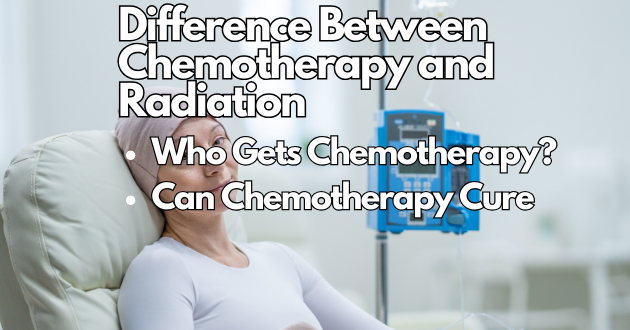Understanding the difference between chemotherapy and radiation is pivotal for anyone navigating the complex world of cancer treatments. Both radiation therapy and chemotherapy play roles in the battle, against cancer each offering methods, advantages and obstacles. As medical progress advances it becomes essential to understand the workings of these treatments, their financial implications and the optimal circumstances, for their application.
What is Chemotherapy?
Chemotherapy is a treatment approach that utilizes medications to either eliminate cancer cells or stop their growth. These medications can be given in ways, such, as by mouth through the veins or directly injected into the area.
The main objective is to target cells that divide rapidly which’s a characteristic trait of cancer cells. However it’s worth noting that this can also impact growing cells in our body like those, in our hair or digestive system resulting in potential side effects.
Who Gets Chemotherapy?
Chemotherapy is a treatment that varies depending on circumstances. It is determined by factors such, as the type of cancer the stage it’s, in where it is located and the overall well being of the patient.
Different patients may receive chemotherapy as their form of treatment while others might undergo it after surgery to eliminate any remaining cancer cells. Understanding the difference between chemotherapy and radiation can help in determining which patients are more suited for chemotherapy.
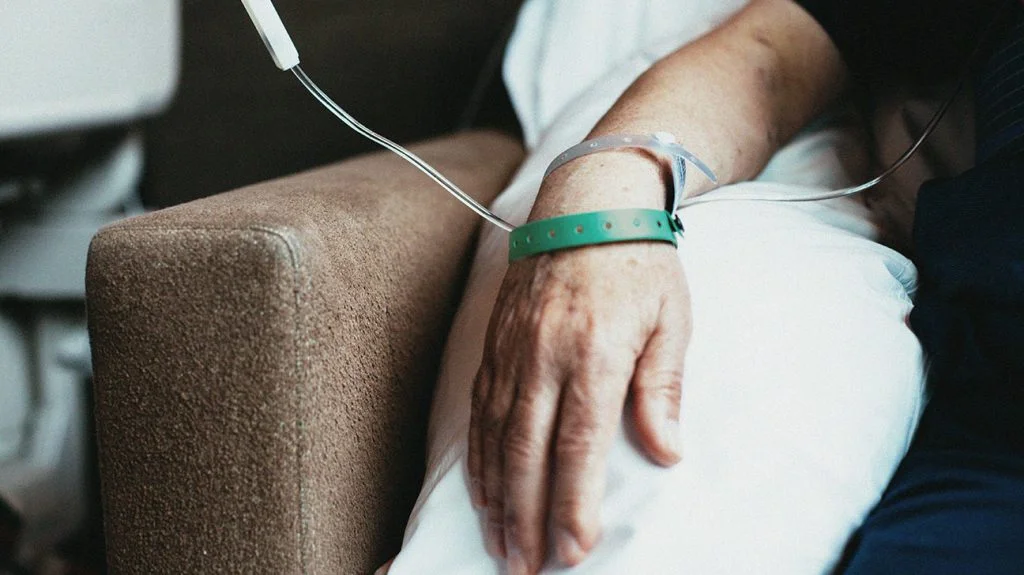
Can Chemotherapy Cause Cancer?
Yes it may seem contradictory. In uncommon cases undergoing chemotherapy can potentially result in the emergence of a secondary form of cancer. This risk arises from the properties of chemotherapy medications that can occasionally inflict damage, to DNA.
However it is important to emphasize that the advantages of utilizing chemotherapy to treat the cancer usually outweigh the risks associated with developing a secondary cancer.
Can Chemotherapy Cure Cancer?
Chemotherapy has been a source of optimism, for individuals. In situations particularly when diagnosed at a stage chemotherapy has the potential to effectively treat cancer. In cases it may not provide a cure but can substantially shrink tumors enabling surgical removal or relieving symptoms.
Can Chemotherapy Cause Blood Clots?
Chemotherapy treatment has the potential to raise the chances of developing blood clots. While these clots can occur in any blood vessel they are often observed in the legs. It’s crucial for patients to stay vigilant and promptly inform their healthcare provider if they notice any indications of clot formation.
Can Chemotherapy Cause Dementia?
Cognitive changes following chemotherapy often referred to as ‘chemo brain’ can manifest as memory lapses trouble concentrating or other cognitive difficulties. However the connection, between these symptoms and dementia is still an area of research.
Are Chemotherapy Drugs Covered by Medicare?
Medicare typically provides coverage for a range of chemotherapy drugs within the scope of Part B or Part D. However it is crucial to review individual plans and consult with healthcare professionals as coverage details may differ.
Are Chemotherapy Drugs Expensive?
The cost of cancer treatment is something that many people worry about. The price of chemotherapy drugs can vary, with some being more affordable and others targeted therapies being more expensive. There are programs and insurance options to help manage these costs.
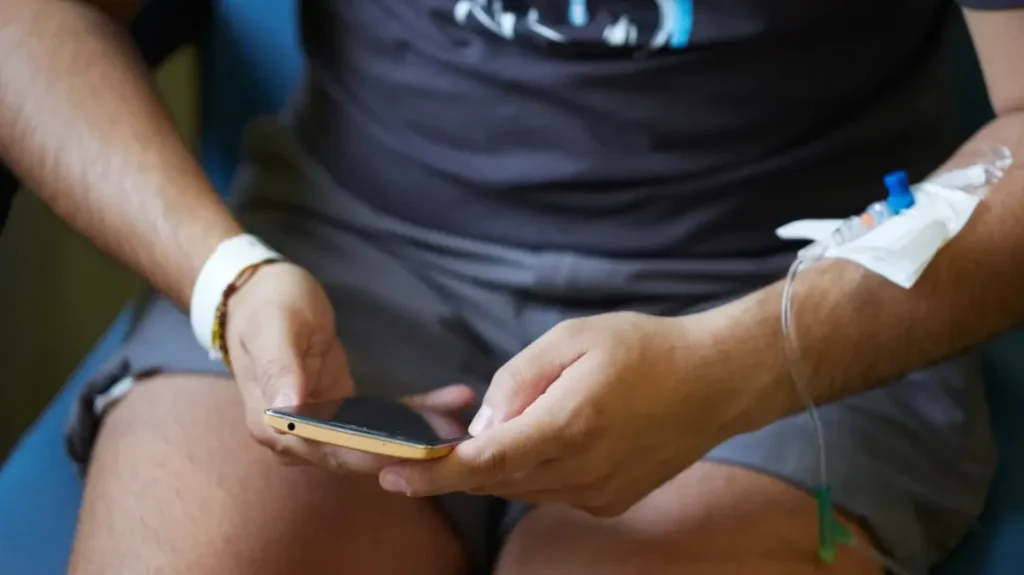
Are Chemotherapy Drugs Carcinogenic?
Certain chemotherapy medications fall under the category of being carcinogenic. This implies that they have the ability to potentially trigger cancer, which may seem contradictory considering their intended purpose. However the overall risk associated with these medications is typically minimal. The potential advantages of utilizing them in treating existing cancer often surpass any associated risks.
Are Chemotherapy Side Effects Permanent?
Chemotherapy may cause side effects, such, as nausea and fatigue. While most of these symptoms are temporary and improve after treatment some can have long term consequences. Even become permanent. For example certain medications can result in lasting nerve damage or affect fertility.
Can Chemotherapy Cause Erectile Dysfunction?
Chemotherapy can have an impact, on well being. For some men it is possible to experience difficulties with function during or, after the treatment. Although this can be worrisome it is often a condition. There are available treatments that can assist in managing this particular side effect.
Do Chemotherapy Patients Emit Radiation?
A common misconception stemming from the difference between chemotherapy and radiation is that chemotherapy patients emit radiation. That statement is incorrect. Chemotherapy does not cause patients to become radioactive.
Does Chemotherapy Hurt?
The process of administering chemotherapy is generally not painful. However the subsequent side effects, such, as mouth ulcers or muscle soreness can be uncomfortable.
Does Chemotherapy Cause Hair Loss?
Hair loss is a recognized and emotionally difficult consequence of undergoing chemotherapy. This happens because the drugs used in chemotherapy target cells that divide rapidly which is a characteristic of cancer cells.
Unfortunately hair follicles also have rapidly dividing cells making them vulnerable, to the impact of chemotherapy. While not all chemotherapy drugs result in hair loss many do, resulting in either complete baldness. The positive aspect is that often hair regrows after treatment is finished although it may have a texture or color, than before.
Which Chemotherapy Drugs Cause Constipation?
Chemotherapy can have effects, on the system. Some specific chemotherapy drugs, like vincristine and vinblastine are known to cause constipation. This can be made worse by nausea medications that are given along with chemotherapy. It’s important for patients to keep talking to their healthcare providers because there are suggestions and medications that can help relieve this side effect.
Which Chemotherapy Causes Hair Loss?
Hair loss is a worry, for individuals receiving chemotherapy treatment. Some chemotherapy medications, such as doxorubicin, cyclophosphamide and taxanes are known to contribute to this issue.
It is crucial for patients to have discussions with their oncologist, about side effects in order to be prepared and have realistic expectations. Although it can be distressing many people find solace in the knowledge that hair typically regrows after the completion of treatment.
Which Chemotherapy Drugs Are Vesicants?
Vesicants refer to a group of medications that if mistakenly leaked from the vein during administration may lead to tissue damage. In the field of chemotherapy, doxorubicin, vincristine and mitomycin are recognized as vesicants.
Healthcare professionals prioritize safety measures during administration; however it is vital for patients to promptly report any discomfort or alterations observed at the injection site.

Which Chemotherapy Causes Peripheral Neuropathy?
Peripheral neuropathy is a condition characterized by nerve damage leading to sensations, like numbness, tingling or pain in the hands and feet. Some chemotherapy medications, including cisplatin, paclitaxel and vincristine have been identified as triggers for this condition. Although it can be unsettling there are treatments and therapies, for effectively managing the associated symptoms.
Which Chemotherapy Causes Mucositis?
Mucositis, which is an inflammation of the membranes can occur as a result of taking certain chemotherapy medications. Specifically drugs such, as 5 fluorouracil, methotrexate and doxorubicin have been associated with this condition.
Mucositis has the potential to impact any area of the tract. May cause symptoms, like mouth sores or diarrhea. To effectively manage and relieve mucositis it is important to maintain hygiene and utilize specific medications.
Which Chemotherapy Causes Neutropenia?
Neutropenia is a condition where the number of blood cells decreases, which increases the vulnerability of patients to infections. Since several chemotherapy medications specifically target growing cells they can unintentionally interfere with the bone marrows ability to produce blood cells resulting in neutropenia. To keep track of this regular blood tests are. If the levels drop excessively appropriate treatments or adjustments, to medication may be implemented.
Are Chemotherapy Drugs Radioactive?
There is a misunderstanding that chemotherapy drugs contain radiation. That is not true.This confusion often arises from not fully understanding the difference between chemotherapy and radiation. Radiation therapy is the treatment, for cancer that utilizes radiation.
What is Radiation?
Radiation therapy, also known as radiotherapy is a procedure that utilizes energy beams or particles to specifically target and destroy cancer cells. Unlike chemotherapy, which impacts the body radiation therapy is focused on the area minimizing harm to nearby healthy tissues.
What Are Radiation Pills?
Radiation tablets, those that contain iodine are a specialized form of treatment mainly employed in the management of specific types of thyroid cancers. When taken orally the radioactive iodine is transported to the thyroid gland, where it selectively destroys cancer cells while minimizing harm to surrounding tissues.
Can Radiation Cause Cancer?
Interestingly even though radiation is used as a cancer treatment unregulated exposure, to doses can actually raise the chances of developing another form of cancer. However in the context of radiation therapy healthcare professionals meticulously control, calculate and monitor the doses to mitigate this risk and maximize the outcomes, for patients.
Can Radiation Kill You?
Exposure, to unregulated levels of radiation can be fatal. Nonetheless in treatments radiation doses are carefully. Administered to prioritize patient well being. The objective is to optimize the destruction of cancer cells while minimizing any impact, on tissues.
Can Radiation Cause Nausea?
Exposure, to radiation particularly when targeted at the abdomen has the potential to cause feelings of queasiness. However there are ways to address this side effect effectively. By making adjustments, to the patients diet and using nausea medications we can ensure their comfort throughout the treatment process.
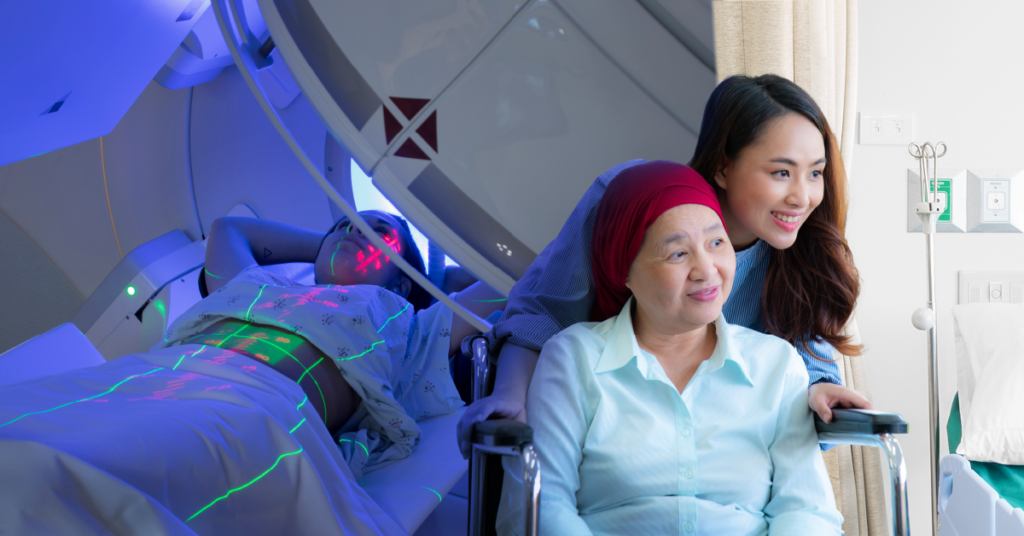
Can Radiation Cause Diarrhea?
Exposure, to radiation in the abdominal region may result in diarrhea as a side effect. Patients can effectively handle this condition by making changes, to their diet and utilizing medications. It is crucial to prioritize hydration throughout this period.
Do Radiation Therapists Get Cancer?
Radiation therapists work in contact, with radiation sources. They follow rigorous safety guidelines wear protective gear and limit their exposure. This ensures that their risk of developing cancer as a result of their profession remains minimal.
Do Radiation Treatments Hurt?
Getting radiation treatment is usually painless. However it can sometimes lead to side effects such, as skin irritation or fatigue which can be uncomfortable. It’s important for patients to let their healthcare provider know about any discomfort or side effects so that they can be properly managed.
Does Radiation Make You Lose Your Hair?
Radiation therapy, unlike chemotherapy only causes hair loss, in the area being treated. This temporary hair loss is. Hair generally regrows after treatment ends although it may have a texture or color.
How Long Does Radiation Affect Your Body?
The short term consequences of radiation such, as fatigue or alterations in the skin may endure for weeks to months following the completion of treatment. Certain effects, such as modifications, in skin texture or pigmentation could potentially become permanent. Nevertheless the bodys natural healing mechanisms persist beyond treatment and numerous side effects gradually lessen with time.
Is Radiation Infrared?
No the type of radiation used in cancer treatment is not infrared. Infrared radiation falls under the category of radiation. It is not employed in cancer therapy. This distinction highlights the importance of understanding the difference between chemotherapy and radiation.
Which One is Better Chemo or Radiation?
There is no answer, as, to whether chemotherapy or radiation’s superior as the choice of treatment depends on several factors. These factors include the type, stage and location of the cancer as the overall health and preferences of the patient.
Which is Harder on the Body Chemo or Radiation?
Chemotherapy and radiation treatment can both have side effects. How they affect the body depends on the treatment plan how long it lasts and the overall health of the patient. Each persons experience can be different, with some finding chemotherapy more difficult while others may struggle more with radiation. It really varies from individual to individual.
What Comes First Chemo or Radiation?
The order in which chemotherapy and radiation therapy are given depends on the type of cancer its stage and the treatment plan created by the oncology team. Sometimes both treatments may be given at the time.
Is Chemo Painful or Radiation?
Administering both chemotherapy and radiation is generally not painful. However there might be some discomfort, due to the side effects like nausea, fatigue or changes, in the skin. Effective management techniques and medications can provide relief from these side effects.
Do You Lose Your Hair with Radiation?
Hair loss caused by radiation therapy is limited to the area being treated. Unlike chemotherapy, which can result in hair loss throughout the body radiation therapy only affects the region targeted by the radiation beams.
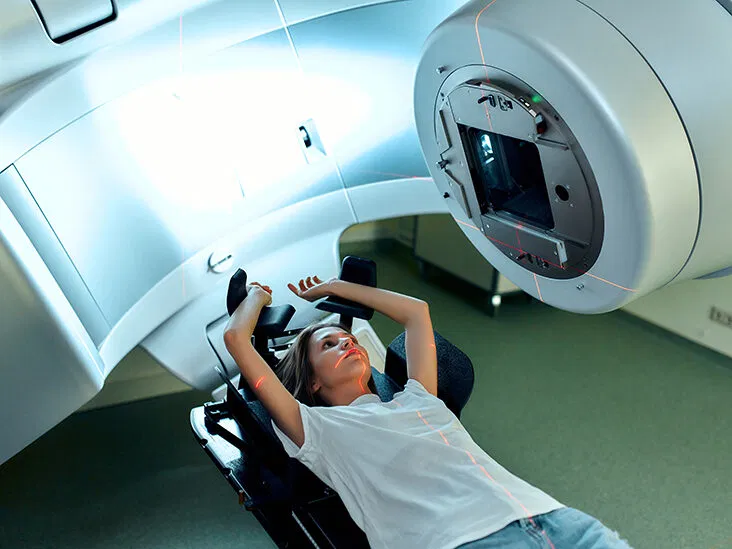
Do You Lose Your Hair with Radiotherapy?
Indeed radiotherapy, also known as radiation therapy may lead to hair loss. Solely, in the specific region receiving treatment. Fortunately this side effect is typically reversible as hair tends to regrow once the treatment is completed.
What Makes You Sicker Radiation or Chemo?
Both chemotherapy and radiation can cause side effects that make patients feel ill. The severity and nature of these side effects can differ depending on the treatment and the individual. For some chemotherapy may present difficulties in terms of side effects while others may find radiation more challenging to cope with.
What Are the 2 Most Common Side Effects of Radiation?
The frequent aftereffects of radiation therapy are tiredness and alterations, in the skin, around the treated region. Skin alterations may manifest as redness, dryness or peeling. These effects can persist for weeks to months following treatment.
What Cancers Only Need Radiation?
Radiation therapy is commonly used as the treatment, for types of cancer. For example when it comes to early stage prostate cancer that is localized radiation therapy alone can often be sufficient.
Similarly certain skin cancers such, as basal and squamous cell carcinomas may only need radiation therapy especially if surgery carries the risk of disfigurement. In addition stage laryngeal cancer, benign brain tumors and initial stages of cervical cancer can all be effectively treated with radiation therapy alone depending on each individuals unique circumstances.
When is Chemo Not Recommended?
Chemotherapy may not be the option, for every type of cancer or patient. In some cases surgery or radiation therapy may offer benefits for early stage cancers. Certain tumors may not react effectively to chemotherapy.
The general well being of a patient particularly if they have health concerns can make chemotherapy unwise. Factors such as the patients age previous treatments and personal decisions made after understanding the risks also play a role, in deciding against chemotherapy.
Which is More Expensive: Chemo or Radiation?
The price of cancer treatments, such, as chemotherapy or radiation can vary due to factors, including the type of treatment how long it is administered and where it is received. The cost of chemotherapy can change depending on the drugs utilized how often they are given and whether they are brand name or generic.
As for radiation therapy the expenses can differ based on the kind of treatment and the number of sessions required. In general radiation may be less expensive, than chemotherapy; however advanced radiation techniques can increase the cost.
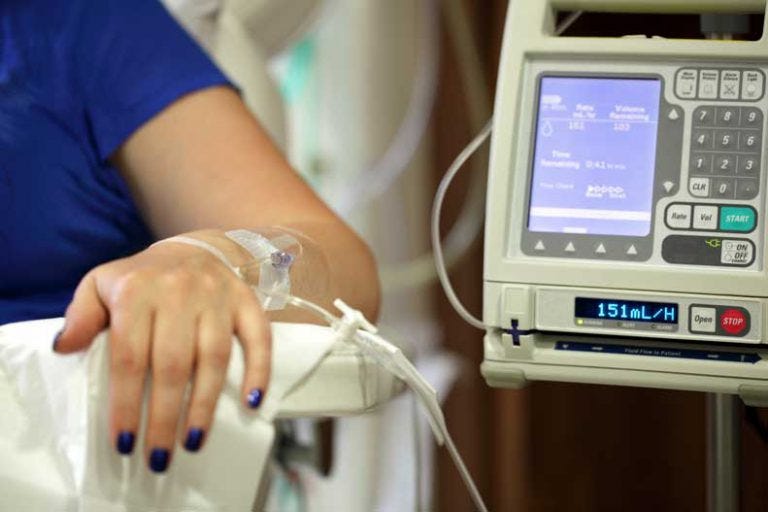
Do You Lose Your Hair with Chemo?
Certainly hair loss can occur as a result of chemotherapy drugs. It is not uncommon for patients to find this side effect emotionally challenging. The good news is that most individuals tend to experience hair regrowth once their treatment is completed.
What Are 3 Side Effects of Radiation Therapy?
Fatigue, alterations, in the skin around the treated region and possible digestive disruptions such, as nausea or diarrhea are three observed consequences of radiation therapy particularly when targeting the abdomen.
Why Switch from Chemo to Radiation?
In cases when chemotherapy isn’t yielding results in treating a tumor or when it becomes necessary to reduce the size of the tumor prior, to undergoing surgery doctors may suggest considering radiation therapy as an alternative. The difference between chemotherapy and radiation in terms of how they act on tumors can make one more effective than the other in specific scenarios.
Do All Cancers Require Chemo or Radiation?
Not every form of cancer requires chemotherapy or radiation therapy. The treatment plan is customized based on factors such, as the type, stage and site of the cancer well as the patients overall well being and personal choices.
Final Thought
Recognizing the difference between chemotherapy and radiation is essential for informed decision-making. Both treatments are components of the approach, to cancer care. Although they have methods and uses their ultimate objective remains unchanged; providing patients with the opportunity for recovery and enhanced quality of life. As research advances the aspiration is to develop efficient and individualized treatments, for individuals fighting against cancer.
 Usalia
Usalia
